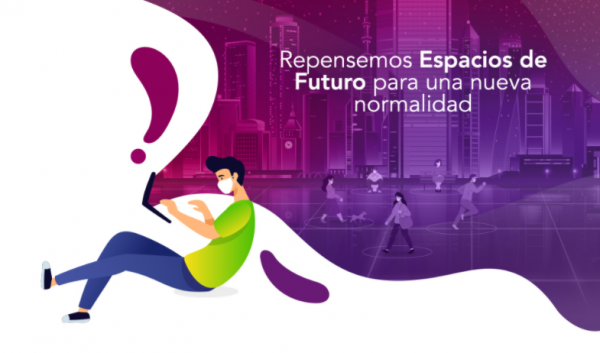
The United Nations Development Program (UNDP), through its Acceleration Laboratory, and the National Network of Business Support for Environmental Protection (ECORED), with the support of private sector institutions, United Nations agencies and higher education, is inviting Dominicans to redefine their cities. The call is to participate in the “Spaces of the Future” initiative. This competition will recognize innovative, sustainable and inclusive proposals that redefine social interactions in urban environments in the face of the new normality of the Covid-19 pandemic.
Spaces of the Future is a national call for innovative proposals to transform public and private spaces in the Dominican Republic’s urban environment, adapt them to the pandemic’s challenges and the new normality, with a focus on sustainability, collaboration, inclusion and resilience.
The initiative was presented in a semi-presential event, transmitted via Zoom on 15 December. It has the support of the Pan American Health Organization (PAHO/WHO), the United Nations Educational, Scientific and Cultural Organization (UNESCO), the National Council of Private Enterprise (CONEP), the Association of Young Entrepreneurs (ANJE), the Pedro Henríquez Ureña University (UNPHU), the Ágora Mall, and PYHEX Work.
Inka Mattila, UNDP resident representative, Jake Kheel, president of ECORED’s board of director and Mauricio Ramirez Villegas, UNDP resident coordinator in the Dominican Republic introduced the initiative.
Mattila explained that this call for proposals seeks innovative, sustainable and inclusive solutions for urban environments in the face of the challenges posed by the reopening and reactivation of the economy. “The crisis driven by the pandemic is interacting with pre-existing gaps and challenges, and puts at risk the economic growth and human development achieved so far,” she warned. “Covid-19 has created a momentum to rethink how we want to move forward into the future (…) warning that if we do not redesign our trajectories of progress, taking responsibility for the pressure we put on our resources, this will not be the last crisis we face on this scale.”
She said the initaitive seeks to identify proposals for urban reordering with a comprehensive approach to human security, local economic development, social cohesion and environmental sustainability. The initiative asks for urban mobility proposals, including public and private transportation, bicycle paths. It wants recommendations for improvements for public recreational and cultural spaces, for squares, parks and sidewalks. It asks what to do with workspaces, relating to access and circulation in office areas and workplaces. And for better recommendations for commercial spaces, such as restaurants, bars, stores and plazas.
The president of ECORED, Jake Kheel pointed out during the event that the return to normal daily activities involves the risk of an increase in virus infection and possibly a second wave of infections. He emphasized the importance of rethinking the use of physical space, public or private. He highlighted that Spaces of the Future is a mechanism to share the best ideas about the use of public and private spaces with the least possible risk of contagion, while there is still no approved vaccine or definitive medicine against Covid-19.
The president of ECORED’s board of directors also pointed out that “although transmission by person-to-person contact is the main vector of Covid-19’s contagion, the return to normalcy presents another challenge: the virus’ ability to survive on surfaces as a potential means of contagion. Hence, the sanitation of spaces is of vital importance in the way countries return to normal.
Read more in Spanish:
Spaces of the Future
18 December 2020

